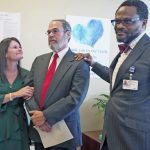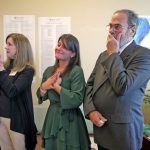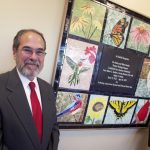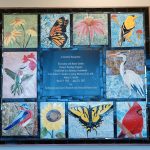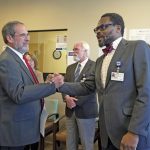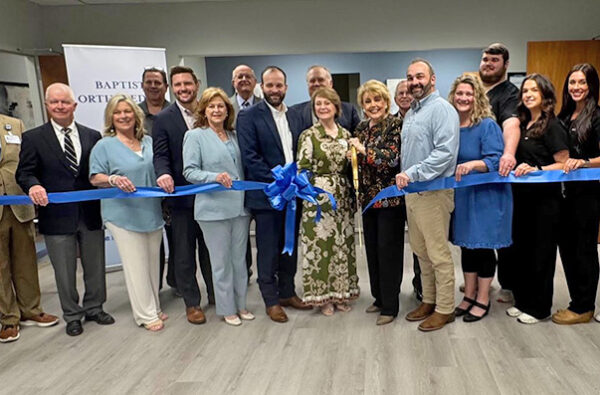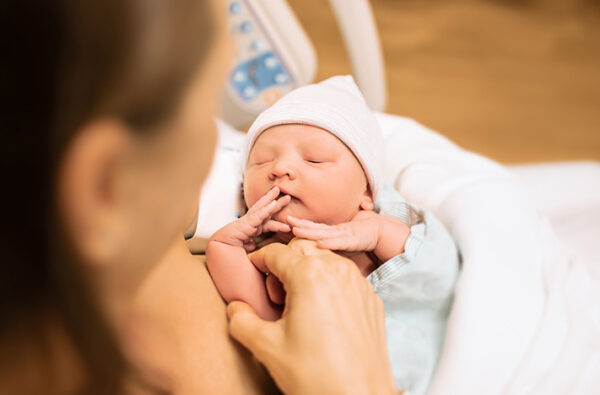Baptist Memorial Health Care dedicated the Audrey and Robert Gordon Thoracic Oncology Program during a ceremony on Thursday, October 27 at the Multidisciplinary Thoracic Oncology Clinic at Baptist Cancer Center. Robert S. Gordon, who had a 36-year career with Baptist, gave an extraordinary gift to the Baptist Memorial Health Care Foundation with the creation of an endowment that will fund in perpetuity lung cancer research and enhanced patient care. Gordon established the Audrey S. Gordon and Robert S. Gordon Endowment in loving memory of his wife, Audrey, who passed away from lung cancer in 2017.
Audrey was an artist, and some of her work is represented in the inspiring collage and plaque that was unveiled during the dedication ceremony. “She was a very creative person, very artistic, very people oriented,” Gordon said of Audrey.
In 2013, Gordon retired from his role as executive vice president and chief administrative officer at Baptist Memorial Health Care. He has continued working with Baptist in a voluntary capacity, as chair of the Steering Committee for the Baptist Memorial Health Care/Mid-South Minority Underserved National Cancer Institute Community Oncology Research Program (NCORP).
“Mr. Gordon was extremely supportive of the Foundation throughout his career, and he has made a transformational gift establishing the Audrey and Robert Gordon Thoracic Oncology Program that will help fund lung cancer research and patient care for years to come. It’s been a great honor to work with Mr. Gordon. The generosity is just remarkable. It’s philanthropy with heart,” said Jenny Prascher Nevels, who recently retired from her role as executive director of the Baptist Memorial Health Care Foundation and is now working on a PRN status for the Foundation.
Audrey was a patient at Baptist Cancer Center under the care of Dr. Raymond Osarogiagbon, chief scientist and director of Baptist Cancer Center’s Multidisciplinary Thoracic Oncology Program and the Thoracic Oncology Research (ThOR) group.
“The progress that’s being made with the treatment of cancer is wonderful, and Baptist is in a leadership role, bringing this to the communities we serve. Dr. Osarogiagbon has been very involved in not just bringing those treatments here, but also with his team in pioneering new approaches toward prevention and early diagnosis of diseases. The strides that have been made are phenomenal,” said Gordon.
He wants to make sure the work the Baptist Cancer Center is doing to advance patient care is made widely available to Memphis and the Mid-South, and that was part of the motivation for him working with the Foundation.
“When diagnosed with stage 4 lung cancer, Audrey said that she wanted her experience of what she was going through to benefit others, and so I think this is a really good way to honor her wishes. She was most appreciative of the care given to her at Baptist and wanted others to have the same access and opportunity,” said Gordon.
Audrey’s lung cancer diagnosis was a shock to the family. She was never a smoker, and she didn’t have exposure to any of the risk factors for lung disease. However, Gordon said it was enlightening to learn that there are a lot of patients like Audrey who suffer from lung cancer because of genetic mutations. Audrey took medication designed to address the genetic issue and was fortunate as it extended her life by as much as 18 precious months.
Often, people without risk factors for lung cancer aren’t screened, and their cancer is found when it’s too late to cure. Sometimes, lung cancer in this group is found incidentally when having medical tests for other issues, such as X-rays taken after a car accident.
Baptist Cancer Center is working to help find lung cancer earlier in people with or without risk factors through research with their Detecting Early Lung Cancer (DELUGE) in the Mississippi Delta project, which includes the combined implementation of Incidental Lung Nodule Programs and low-dose CT lung cancer screening programs across the health care system. DELUGE is part of Baptist Cancer Center’s Mid-South Miracle – a multifaceted initiative that aims to reduce lung cancer deaths by 25% by 2030.
Mid-South Miracle addresses prevention, diagnosis and treatment of lung cancer with smoking cessation, low-dose CT screening, algorithmic management of incidentally detected lung nodules, multidisciplinary decision-making and care, high-quality surgical care, high-quality pathologic evaluation with biomarker testing and expanded access to innovative treatment through clinical trials.
Dr. Osarogiagbon said the findings from the Incidental Lung Nodule Program, which began in 2015, have been surprising. For each high-risk person with lung cancer, they found six lung cancer patients in the incidental group who were considered low risk. The program also found that 40% of patients in the Incidental Lung Nodule Program quit smoking more than 15 years ago, so they wouldn’t have qualified for routine lung cancer screening.
Increasing access to innovative treatment through clinical trials is an important component of Mid-South Miracle. Gordon said that Audrey wanted others to have the same opportunity to receive excellent care close to home instead of needing to travel to other parts of the country to participate in leading-edge clinical trials.
“She wanted to be at home in the community where her family and friends were. She didn’t want to have to travel to other cities where she had to spend time in hotel rooms and unfamiliar surroundings. There’s the treatment of the disease, and there’s the treatment for the patient. It goes beyond just the clinical, and the good thing is, with Dr. Osarogiagbon’s work and what we’re doing, we can bring more clinical trials to Memphis,” said Gordon.
The population demographics in Baptist’s service areas are challenging for lung cancer treatment. Dr. Osarogiagbon noted that 44% of the 111 counties covered by Baptist are in the Delta Regional Authority area, regarded by the U.S. Congress as the most socio-economically challenged part of the U.S. Baptist’s service areas are also in states with some of the highest rates of lung cancer incidences and mortality in the country.
“We don’t have the wealthiest of populations, but we have the largest of health care challenges. We have so much battlefield experience delivering care for lung cancer that we needed to claim that expertise and step up and be active in creating the new knowledge that helps us learn and teach how to do better for our population, how to find lung cancer earlier when it can still be cured, and how to treat it in such a way that the promise of a cure can be achieved, how to manage it in such a way that people are able to get world-class care as close to home as they can,” said Dr. Osarogiagbon.
Dr. Osarogiagbon said tackling the challenges of lung cancer in our area requires a shift from business as usual to a new paradigm where we become much more intentional and proactive in reaching into the community to understand what the needs are and figuring out how to better serve patients.
“That shift also requires measuring what you do to make sure you’re getting the best possible outcome. If you’re not, you learn from that and figure out a better way. It’s the learning health system, where every patient you encounter you can use to create a new understanding on how to do things better. That’s the fundamental approach we are taking, and it’s very different. It requires a lot of upfront investment,” said Dr. Osarogiagbon.
Dr. Osarogiagbon hopes Gordon’s gift will attract others to invest, as well. He said, “The gift from Audrey and Robert is a seed investment to help us attract more research to grow. We can transform care.”


